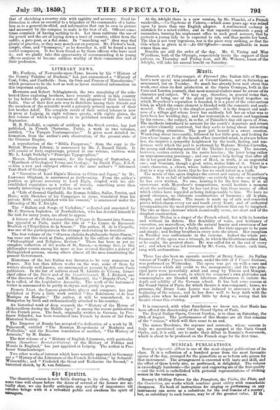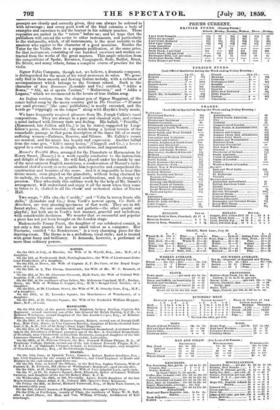MUSICAL PUBLICATIONS.
Boosey's Operatic Album is one of the most elegant publications of its class. It is a collection of a hundred gems from the most favourite operas of the day, arranged for the pianoforte so as to form solo pieces for that instrument. The arrangement is executed with taste and skill, and the effect of these lovely airs, so performed, is delightful. The volume is exceedingly handsome—the paper and engraving are of the first quality —and the work is embellished with pictorial representations of striking scenes in the various operas.
Boosey's Shilling ntors for the Pianoforte, the Violin, the Flute, and the Concertina, are works which combine great utility with remarkable cheapness. No book of instructions for singing or performing on any instrument can serve as a substitute for the oral lessons of a master ; but, as subsidiary to such lessons, may be of the greatest value. If th
precepts are clearly and correctly given, they can always be referred to with advantage ; and every good. work of the kind contains a body of examples and exercises to aid the learner in his solitary practice. These requisites are united in the " tutors " before us; and we hope that the publishers will extend the series to other instruments, and particularly to the violoncello, which, of all instrnments, is the most suitable to the amateur who aspires to the character of a good musician. Besides the Tutor for the Violin, there is a separate publication, at the same price, for that instrument, consisting of one hundred exercises and studies ex- tracted from the works of the great masters. This ample selection from the compositions of Spohr, Ereutzer, Campagnoli, Rode, Ballot, Ernst, De Beriot, and many others, forms a complete course of practice for the violin.
Signor Fabio Campana, though not, we believe, a dramatic composer, is distinguished for the merit of his vocal moreeaux de salon. We gene- rally find in them smooth and flowing Italian melody, with a richness of accompaniment which belongs to the German school. Such is the character of four Romances (Lonsdale and Co.) entitled, " Addio a Roma," i.Al1i, mi si spezia l'anima," " Malinconia," and " Addio a Lugano," which we recommend to the lovers of true Italian song.
An Italian version, from the elegant pen of Signor Maggioni, of the comic ballad sung by the merry country girl in The Creegion-"D'amor per umil giovane," (the same publishers,) is neatly executed, and the words go "trippingly on the tongue" along with Haydn's lively music, We have frequently received pleasure from Mr. Joseph Calkin's vocal compositions. They are always in a pure and classical style, and evince a mind imbued with literary taste and feeling. His ballad, "Priscilla," (Hammond, late JuRien and Co.,) is (as he states) suggested by Long- fellow's poem, Miles Standish ; the words being a lyrical version of the remarkable passage in that poem descriptive of the inner life of so many suffering women-Patience' Reserve, and Silence. Mr. Calkin's verses are musical, and his music has beauty and expression. Another ballad from the same pen, "Life's sunny hours," (Chappell and Co.,) a lover's appeal to a cruel mistress, is simple, melodious, and impassioned.
Mozart's Tvelfth Mass, arranged for the Pianoforte or Harmonium by Henry Smart, (Boosey,) is a work equally conducive to the instruction and delight of the student. He will find, placed under his hands by one of the most eminent English musicians, a condensation of Mozart's eccle- siastical chef-d'oeuvre, so as to enable him to perceive and comprehend the construction and beauties of the score. And it is impossible to hear this divine music, even played on the pianoforte, without being charmed by its melody, its clearness, its profound combinations, and its strong ex- pression. They who study this sublime work by the help of Mr. Smart's arrangement, will understand and enjoy it all the more when they come to listen to it, clothed in all the choral and orchestral riches of Exeter Hall.
Two songs, " Alla vita che t' arride," and "Volta la terrea fronte alle gene " (Lonsdale and Co.,) from Verdi's newest opera, Un Ballo di Maschera, are very pleasing specimens of that work. They are in dif- ferent styles; the one sentimental and pathetic-the other quaint and playful ; but both are in Verdi's best manner, graceful and melodious, with considerable freshness. We wonder that so successful and popular a piece has not yet been brought on the London stage.
Mademoiselle Fanny Puzzi, the daughter of our celebrated consist, is not only a fine pianist, but has no small talent as a composer. Her Nocturne, entitled "Le Rendezvous," is a very charming piece for the drawing-room. The theme is in a melodious vocal style; and is treated with great fancy and brilliancy. It demands, however, a performer of more than ordinary powers.



























 Previous page
Previous page